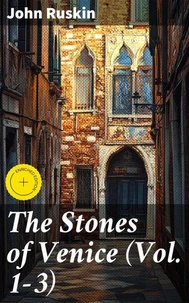Unto This Last, and Other Essays on Political Economy
Par :Formats :
Disponible dans votre compte client Decitre ou Furet du Nord dès validation de votre commande. Le format ePub est :
- Compatible avec une lecture sur My Vivlio (smartphone, tablette, ordinateur)
- Compatible avec une lecture sur liseuses Vivlio
- Pour les liseuses autres que Vivlio, vous devez utiliser le logiciel Adobe Digital Edition. Non compatible avec la lecture sur les liseuses Kindle, Remarkable et Sony
 , qui est-ce ?
, qui est-ce ?Notre partenaire de plateforme de lecture numérique où vous retrouverez l'ensemble de vos ebooks gratuitement
Pour en savoir plus sur nos ebooks, consultez notre aide en ligne ici
- Nombre de pages301
- FormatePub
- ISBN859-65--4732533-8
- EAN8596547325338
- Date de parution15/09/2022
- Protection num.Digital Watermarking
- Taille540 Ko
- Infos supplémentairesepub
- ÉditeurDIGICAT
Résumé
In "Unto This Last, and Other Essays on Political Economy, " John Ruskin challenges conventional economic theories of the 19th century by interweaving moral philosophy with socio-economic critique. Ruskin adopts a highly eloquent and accessible literary style, blending rhetorical flourishes with poignant observations on wealth, labor, and the moral responsibilities of society. His essays stand as a counterpoint to utilitarian economic practices, presenting a vision where economic principles align with ethical imperatives, thus situating his work within the broader context of the Industrial Revolution and its social repercussions.
John Ruskin (1819-1900) was a prominent critic, social thinker, and art theorist whose multifaceted engagement with literature and visual arts profoundly influenced his economic writings. His upbringing amidst the natural beauty of the Lake District and his profound appreciation for craftsmanship inform his arguments against the dehumanization of labor, presenting a philosophy that champions the dignity of work and community welfare.
The intellectual milieu of Victorian Britain, characterized by rapid industrialization, undoubtedly shaped his perspectives as he sought to reestablish moral values within economics. This compelling collection is essential reading for those interested in the intersections of economics, ethics, and society. Ruskin's insights resonate with contemporary debates on capitalism and social justice, making it a crucial text for scholars and general readers alike.
By engaging with Ruskin's thought, readers are invited to reconsider the very foundations of economic systems in light of human dignity and communal health.
John Ruskin (1819-1900) was a prominent critic, social thinker, and art theorist whose multifaceted engagement with literature and visual arts profoundly influenced his economic writings. His upbringing amidst the natural beauty of the Lake District and his profound appreciation for craftsmanship inform his arguments against the dehumanization of labor, presenting a philosophy that champions the dignity of work and community welfare.
The intellectual milieu of Victorian Britain, characterized by rapid industrialization, undoubtedly shaped his perspectives as he sought to reestablish moral values within economics. This compelling collection is essential reading for those interested in the intersections of economics, ethics, and society. Ruskin's insights resonate with contemporary debates on capitalism and social justice, making it a crucial text for scholars and general readers alike.
By engaging with Ruskin's thought, readers are invited to reconsider the very foundations of economic systems in light of human dignity and communal health.
In "Unto This Last, and Other Essays on Political Economy, " John Ruskin challenges conventional economic theories of the 19th century by interweaving moral philosophy with socio-economic critique. Ruskin adopts a highly eloquent and accessible literary style, blending rhetorical flourishes with poignant observations on wealth, labor, and the moral responsibilities of society. His essays stand as a counterpoint to utilitarian economic practices, presenting a vision where economic principles align with ethical imperatives, thus situating his work within the broader context of the Industrial Revolution and its social repercussions.
John Ruskin (1819-1900) was a prominent critic, social thinker, and art theorist whose multifaceted engagement with literature and visual arts profoundly influenced his economic writings. His upbringing amidst the natural beauty of the Lake District and his profound appreciation for craftsmanship inform his arguments against the dehumanization of labor, presenting a philosophy that champions the dignity of work and community welfare.
The intellectual milieu of Victorian Britain, characterized by rapid industrialization, undoubtedly shaped his perspectives as he sought to reestablish moral values within economics. This compelling collection is essential reading for those interested in the intersections of economics, ethics, and society. Ruskin's insights resonate with contemporary debates on capitalism and social justice, making it a crucial text for scholars and general readers alike.
By engaging with Ruskin's thought, readers are invited to reconsider the very foundations of economic systems in light of human dignity and communal health.
John Ruskin (1819-1900) was a prominent critic, social thinker, and art theorist whose multifaceted engagement with literature and visual arts profoundly influenced his economic writings. His upbringing amidst the natural beauty of the Lake District and his profound appreciation for craftsmanship inform his arguments against the dehumanization of labor, presenting a philosophy that champions the dignity of work and community welfare.
The intellectual milieu of Victorian Britain, characterized by rapid industrialization, undoubtedly shaped his perspectives as he sought to reestablish moral values within economics. This compelling collection is essential reading for those interested in the intersections of economics, ethics, and society. Ruskin's insights resonate with contemporary debates on capitalism and social justice, making it a crucial text for scholars and general readers alike.
By engaging with Ruskin's thought, readers are invited to reconsider the very foundations of economic systems in light of human dignity and communal health.




